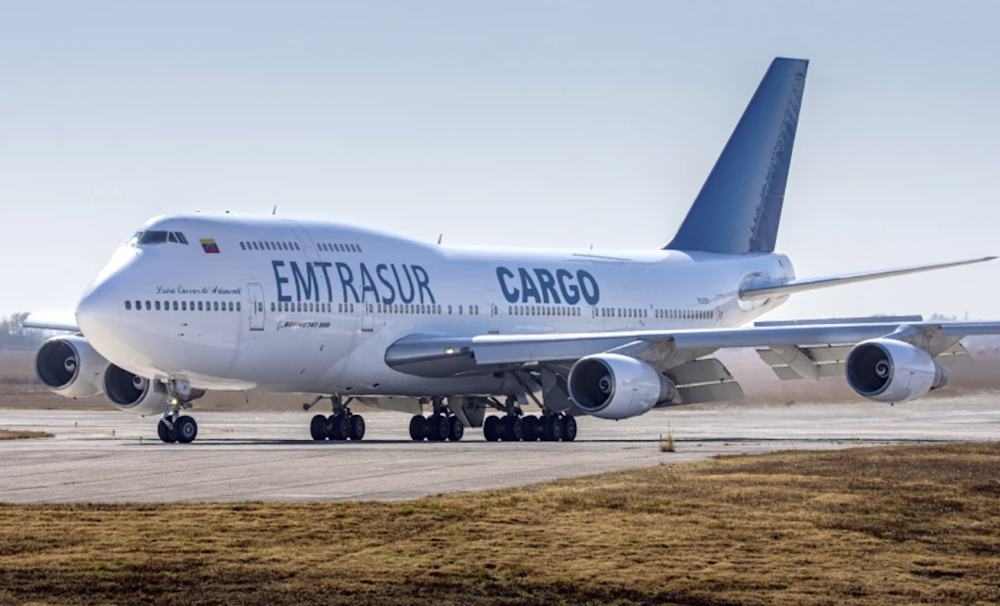US, Argentina 'covertly' seize Venezuelan jumbo jet
According to US sources, the aircraft was formerly owned by Mahan Air, a sanctioned Iranian airline accused of transporting weapons and fighters for the IRGC, with no proof provided.
-

A Venezuelan-owned Boeing 747 operated by Venezuela's state-owned Emtrasur cargo line, taxis on the runway after landing in Cordoba Argentina on June 6m 2022. (AP)
US authorities have detained a Venezuelan cargo jet, claiming it formerly belonged to an Iranian airline purportedly associated with the Quds Force of the Islamic Revolution Guard Corps. Caracas has condemned the decision, stating that the planes were transferred to the US covertly.
The US Department of Justice (DOJ) website detailed on Monday that the American-manufactured jumbo jet was delivered to the US on February 11 by Argentina's government, which had held the aircraft in 2022.
According to US sources, the aircraft was formerly owned by Mahan Air, a sanctioned Iranian airline accused of transporting weapons and fighters for the IRGC, whom the US considers a "terrorist organization". No proofs of such activity have been provided.
Mahan Air had previously sold the seized plane to Venezuelan cargo carrier Emtrasur in a transaction that, according to DOJ Assistant Attorney General, Matthew G. Olsen, allegedly "violated US export control laws and directly benefited the IRGC." He went on to say that the US was "committed to ensuring that the full force of US laws deny hostile state actors the means to engage in malign activities that threaten our national security."
The DOJ stated that the aircraft is currently being "prepared for disposition" but did not provide any other information.
Venezuela's government has branded the jet seizure as "blatant theft" and an act of "collusion" between the US and Argentina that violates civil aeronautics norms, as well as Emtrasur's "commercial, civil, and political rights."
Venezuelan Foreign Minister Yvan Hill denounced the secret nature of the transfer in a statement issued on X, accusing the US and Argentina of withholding information when identifying the plane and repeatedly turning off the 747's transponders on Sunday on the way to the US.
Venezuelan Transport Minister Ramon Araguayan also wrote on X emphasizing how the US and Argentina violated several International Civil Aviation Convention articles.
El Gobierno de USA y de Argentina perpetraron el robo del avión de EMTRASUR, violando el Convenio de Aviación Civil Internacional (Chicago 1944) en sus Artículos: 3, 4, 12, 16, 17, 18, 19, 20, 27, 29, 31, 32, 33, 81, 84. Apalancaron la decisión, a través de un Acuerdo de Ayuda… pic.twitter.com/fpp2pW4eaG
— Ramón Celestino Velásquez Araguayán (@rvaraguayan) February 13, 2024
While Mahan Air has denied any ties to the aircraft, Caracas has promised a “forceful, direct and proportionate response to this attack,” vowing to take “all actions to restore justice and achieve the restitution of the aircraft to its legitimate owner.”
US broke int'l law spying on Venezuela officials via covert program
The Associated Press recently obtained a memo detailing a years-long covert operation by the United States Drug Enforcement Administration that sent undercover operatives into Venezuela to secretly record and build alleged drug-trafficking cases against the country's leadership; a plan the US acknowledged from the very beginning was potentially a violation of international law.
Operation Money Badger reportedly targeted dozens of people, including Venezuelan President Nicolas Maduro.
Recently, Maduro accused the DEA and CIA of destabilizing the nation. In a TV interview, he expressed that he does not believe US President Joe Biden is directly involved but expressed that the "CIA and the DEA operate independently as imperialist criminal organizations.”
According to AP, the highly classified document was written during former President Donald Trump's "maximum pressure" campaign against Venezuela.
Within weeks of Maduro's election, senior DEA officers planned to use at least three undercover informants for the said operation.
The DEA, under the guise of exposing Colombian drug traffickers and "corrupt officials", enabled illegal wire transfers through US-based front firms and bank accounts.
It is worth noting that this operation is not the first of its kind.
In 1998, Mexico was not told about a three-year money laundering sting known as Operation Casablanca, which was partially carried out on Mexican soil and included around 160 individuals, including numerous bank officials.

 4 Min Read
4 Min Read








